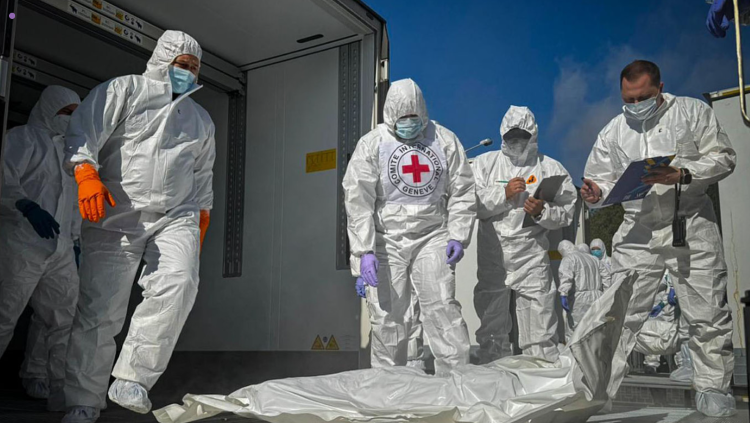Playwright Makram Ayache’s The Green Line begins previews at Buddies in Bad Times Theatre in Toronto, on Friday.Brandynn Leigh Photography/Supplied
Playwright Makram Ayache was twisting his body as part of York University’s postgraduate performance creation program when a quick glance in the mirror stopped him in his tracks: There was his father staring back at him.
“I looked so much like him,” Ayache recalls of that fateful moment seven years ago. “I had just moved to Toronto – it was the first time I’d ever moved out of my family’s home in Alberta. But there he was in the mirror.”
That moment ultimately became the seed for Ayache’s The Green Line, about a young man on a mission to bury his father in Lebanon. The play uses two parallel stories – a dangerous romance between two women in 1978, and a haunted homecoming in 2018 – to paint a portrait of Beirut that resists stereotype, with deep plunges into what it means to be both queer and Arab.
The Green Line had its world premiere in Calgary in 2022, when it won the Betty Mitchell Award for outstanding new play, and was later named a Governor General’s Award finalist in 2024. On Sept. 19 it begins previews at Buddies in Bad Times Theatre, in a co-production between Buddies, In Arms Theatre Company, the MENA Collective and Factory Theatre.
Ayache, born in Lebanon but raised in rural Alberta, will direct the Toronto production – a shift for the writer, who has appeared in his own work (including previous stagings of The Green Line and The Hooves Belonged to the Deer) but seldom directed it.
“This is my first time directing a full production with a beginning, middle and end,” he says. “I’m learning a lot, I’m stretching in so many ways. My appetite for this is so big. I know this play really well, because I’ve performed in it twice. But I’ve also revised it, made it tighter and cleaner and stronger.
“Directing is an extension of writing,” he continues. “It’s like writing in overdrive, writing in 3-D. I’m surprised by how much trust and faith people have in me about what the story is, and what we’re doing. I don’t take that responsibility lightly at all.”
Ayache’s The Green Line is about a young man on a mission to bury his father in Lebanon.Brandynn Leigh Photography/Supplied
Indeed, The Green Line is an ambitious undertaking, a partially bilingual epic that benefits from a nuanced understanding of the Middle East’s history, as well as how that history has shaped today’s world. The title refers to the 1949 armistice border – the line of demarcation between Israel and its neighbouring countries – and geopolitical conflict reverberates through the dual storylines. You can almost smell the smoke between the pages.
The play does not offer any easy outs as far as producing it – Ayache’s stage directions read more like poetry than instructions for a theatrical experience. A drag queen’s costume “is like a forest fire, consuming the flora, making way for new growth,” Ayache writes in the printed script. Memories “glow” around characters as they speak.
“When you’re a writer and you hand your work off to a director, you trust their vision and you compromise,” Ayache says. “On this occasion, there’s no one to negotiate between the writer and the director. I get to really explore the thing as theatrically as I can imagine it.”
That friction between what’s written and what’s achievable onstage is a common theme in Ayache’s work, as is dialogue imbued with subtext: Often, his characters will say one thing but mean another, while society twists around them. The Green Line is full of such contradictions, particularly in its 1978 half.
“These are two women in Lebanon in the seventies who are falling in love, and they have to use this doublespeak,” he says. “They say, ‘We’re working on this assignment together,’ but really they mean, ‘I want to kiss you. I want to touch you.’ We’re playing with paradox a lot, which is something I’m always interested in: What are my firm beliefs and my values? How can someone be so opposite from me, but equally firm in their beliefs? I always try to reconcile and understand that paradox – I’m never surprised when I see echoes of that in my work.
“Two things can be true at the same time,” he continues. “This play has five Arab characters, and they’re not all perfect. I don’t think the antidote to flattened stereotypes of Arabs – who most often are portrayed as terrorists – is perfect Arabs. The antidote is complex people, people full of contradictions, characters who can help make something meaningful out of the absurdity that is this life.”
Review: Smart and sensual The Hooves Belonged to the Deer hits Tarragon Theatre
Ayache recognizes the truth of that statement beyond the pages of his play. For nearly two years, many Westerners have followed the situation in Gaza through social-media algorithms that favour polarization and controversy. While The Green Line is not about the Israel-Hamas war, the play references the region with quick, bruising remarks: “A refugee by birth,” one character calls a Palestinian.
The Green Line opens Buddies in Bad Times’ 2025-26 season – the first full slate of programming since the company was one of 18 Canadian theatre institutions to endorse PACBI (the Palestinian Campaign for the Academic and Cultural Boycott of Israel) in March.
Ayache says the timing of the production is coincidental – but he also sees the beauty in it.
“PACBI is a beautifully considered action, designed by Palestinians and others who are thinking of non-violent ways to resist occupation,” he says. “I’m encouraged, and I believe Buddies when they say they’re trying to support Palestinian and Arab artists. It was a series of coincidences that aligned that I’m opening their season, but it’s not a bad thing. I hope Arabs know they’re safe at Buddies. That’s all I could have dreamt of when I was 16 – a queer theatre that says, ‘Hey Palestinians, you can come here if you want to develop your art.’”
As opening night inches closer, Ayache is taking it all in – the rush of directing, as well as the gratitude of being able to tell this story exactly as it needs to be told.
“I always thought this play was silly, in a way,” he says. “I wrote it between 2017 and 2019, and my dad passed away in 2021. A character goes to a gay club right near the top of the play, just after his father’s funeral, and I always thought, ‘That’s not real. No one would ever do this.’ But my experience of grief was very similar to that. As I’ve been revisiting the play, and hearing another actor in the role, it’s been so very satisfying and beautiful to recognize those emotional truths.”


![19th Sep: A Bright Lawyer (2024), 1hr 36m [TV-MA] (6/10)](https://occ-0-1731-999.1.nflxso.net/dnm/api/v6/Qs00mKCpRvrkl3HZAN5KwEL1kpE/AAAABUt9BkM33P2n61HM4dz-GQqnMyYNZGzRUFil7q9qk6ZEcxw9PXfvk-ydneAkJ5OywDJmcg-aXQXmbpi-Zqr_2sZ_u8nGKAU47ySGH28UqMpvmoX1AKQY_9GfERyqishsVUBFHfEE_nVdsznX8DuiUXLzFPio-an0YSCLrtbX8wIQGA.jpg?r=93f)




![19th Sep: Anpanman: The Secret of Fairy Rin-Rin (2008), 52m [TV-Y7] (6/10)](https://occ-0-1731-999.1.nflxso.net/dnm/api/v6/Qs00mKCpRvrkl3HZAN5KwEL1kpE/AAAABff6dpt8OWzEVmZZnI0qMsfQkr1Ha27u-Mg9R4E0THRJKiif1uCfNBqT4Wl9_Mqk4LsUz1FB3bEgGTEIaHXhOUJPT4n2lFVNlIje7RVzg3_lo2u0dZ0c9C-IzNivNOcozTNc6gdoMGGEWJVEtXB0Y8Frlbbryhbu0SlBXHupJtmczA.jpg?r=722)



